|
|
|
Sort Order |
|
|
|
Items / Page
|
|
|
|
|
|
|
| Srl | Item |
| 1 |
ID:
156863


|
|
|
| 2 |
ID:
143925
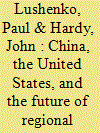

|
|
|
|
|
| Summary/Abstract |
The concept of order in regional security is often characterized as hierarchical, consensus-based, or some hybrid middle-road. The debate largely focuses on how major powers, specifically China or America, can individually build an accommodating order. This article explores the causation of order-building in reverse by asking if the Sino-US relationship can create order as a by-product of individual attempts to build and manage security. It examines Chinese and American responses to North Korea and the South China Sea to demonstrate that order can be constructed through a complex set of negotiated interactions, which encompass cooperative, hierarchical, and consensus-building approaches to order-building. This “unhappy coexistence” implies that order as a by-product of state interaction is a useful but incomplete framework to understand security order-building.
|
|
|
|
|
|
|
|
|
|
|
|
|
|
|
|
| 3 |
ID:
152283
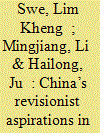

|
|
|
|
|
| Summary/Abstract |
China has significant revisionist objectives in Southeast Asia, including revamping the existing regional security architecture and strategic realignment, reforming the current regional political and security institutions, revising the rules and norms that help regulate regional relations, and aspiring to play a bigger role in regional agenda-setting. Beijing has achieved some success in changing the regional status quo through its good-neighbourliness policy over the past 20 years. But the intricate South China Sea issue is likely to prevent China from fulfilling its revisionist aspirations in the region in the decades to come.
|
|
|
|
|
|
|
|
|
|
|
|
|
|
|
|
| 4 |
ID:
147533
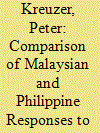

|
|
|
|
|
| Summary/Abstract |
The conflicts in the South China Sea have caught much attention in the past few years. The vast majority of academic studies focus almost exclusively on the Sino-Vietnamese and the Sino-Philippine conflicts in the South China Sea and the Sino-Japanese conflict in the East China Sea. By not considering the structurally fairly similar conflict between China and Malaysia and generally focusing on the past decade only those analyses neglect variation in Chinese conflict behaviour over time and between opponents. This article compares the high-profile Sino-Philippine conflict to the rather smooth relations between China and Malaysia. Whereas China has regularly challenged Philippine claims and activities in disputed regions, it has exhibited much more restraint towards Malaysia, even though the two countries’ claims overlap and Malaysia, unlike the Philippines, has been extracting substantial resources (LNG) from regions disputed with China since the 1980s. I argue that much of the observable between-country and over-time variation in Chinese conflict behaviour is rooted in the approaches chosen by China’s opponents for framing their overall bilateral relationships with China. Specifically, it is argued that China’s opponents in territorial and maritime conflicts can assuage Chinese behaviour on the ground by signalling recognition and respect of China’s overall self-role and world-order conceptions. Conversely, if they challenge the overarching Chinese self-role and world-order conceptions, China tends towards a coercive strategy. China will also tolerate higher levels of assertiveness of its opponent in the contest for sovereignty, when the opponent displays respect for China’s recognition needs.
|
|
|
|
|
|
|
|
|
|
|
|
|
|
|
|
| 5 |
ID:
117652
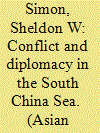

|
|
|
|
|
| Publication |
2012.
|
| Summary/Abstract |
Disputes over sovereignty and freedom of navigation in the South China Sea (SCS) involve both the claimants and major maritime powers. Two starkly different approaches to the SCS conflict are discussed: (1) diplomacy among the claimants either bilaterally or multilaterally; (2) if diplomacy fails, the claimants are building their militaries to assert their rights through force.
|
|
|
|
|
|
|
|
|
|
|
|
|
|
|
|
| 6 |
ID:
141409


|
|
|
|
|
| Summary/Abstract |
Observances last year of the one hundredth anniversary of the Great War, as it was known until a second global conflict gave it a roman numeral, have paid deference to its status as the most brutal conflict in human existence as well as one whose influence we still live with today.
|
|
|
|
|
|
|
|
|
|
|
|
|
|
|
|
| 7 |
ID:
156866
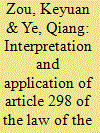

|
|
|
| 8 |
ID:
149042
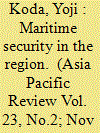

|
|
|
|
|
| Summary/Abstract |
This article examines the situations in the South China Sea (SCS) and East China Sea (ECS) and the reasons for recent political and strategic attention. As background it reviews the history of maritime activities in Asia where there was no real maritime Great Power with continuity. It then discusses the latest situations in the ECS around the Senkaku Islands, where China's Coast Guard vessels and fishing boats have made occasional incursions into Japanese waters, and the relatively-less understood Scarborough Shoal and the Pratas Islands in the SCS that have strategic significance in a future powerbalance in the SCS. The article then notes the US rebalance to Asia and the interpretation of the principle of Freedom of Navigation. It continues with the strategic and diplomatic measures and operational and tactical measures that Japan should take. It concludes noting that Japan and the US must prepare a wide range of measures in advance to regain and maintain maritime security and stability.
|
|
|
|
|
|
|
|
|
|
|
|
|
|
|
|
| 9 |
ID:
147107
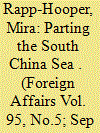

|
|
|
|
|
| Summary/Abstract |
July 12, 2016, marked a turning point in the long-standing disputes over the South China Sea. After more than three years of proceedings at the Permanent Court of Arbitration, an international body in The Hague, a tribunal constituted under the UN Convention on the Law of the Sea (UNCLOS) issued a widely anticipated decision in a case the Philippines brought in 2013 to challenge China’s maritime claims [2] to most of the contested waterway
|
|
|
|
|
|
|
|
|
|
|
|
|
|
|
|
| 10 |
ID:
145191
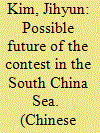

|
|
|
|
|
| Summary/Abstract |
Since emerging from its century of humiliation, China has repositioned itself as a rising power. China’s great power potential, combined with its latent expansionism and assertive foreign policy behaviour, however, has intensified regional and global security concerns. Among the issues that support the ‘China threat’ theory, that of the South China Sea disputes has become one of the most widely debated security concerns in the region. This study is designed to examine the power game between China and its neighbours which revolves around these disputes. It also looks into the role that the United States plays in managing these regional tensions and the US leadership’s prospects as regards facilitating China’s peaceful rise and transforming this potentially dangerous geopolitical flashpoint into an opportunity to build a more cooperative regional order.
|
|
|
|
|
|
|
|
|
|
|
|
|
|
|
|
| 11 |
ID:
147102


|
|
|
|
|
| Summary/Abstract |
The next U.S. president will inherit [1] a security environment in which the United States con¬fronts mounting threats with increasingly constrained resources, diminished stature, and growing uncertainty both at home and abroad over its willingness to protect its friends and its interests. Revisionist powers in Europe [2], the western Pacific [3], and the Persian Gulf [4]—three regions long considered by both Democratic and Republican administrations to be vital to U.S. national security—are seeking to overturn the rules-based international order. In Europe, Russian President Vladimir Putin has seized Crimea [5], waged proxy warfare in eastern Ukraine [6], and threatened NATO allies on Russia’s periphery. Further demonstrating its newfound assertiveness, Russia has dispatched forces to Syria and strength-ened its nuclear arsenal. After a failed attempt to “reset” relations with Moscow, U.S. President Barack Obama has issued stern warnings andimposed economic sanctions [7], but these have done little to deter Putin.
|
|
|
|
|
|
|
|
|
|
|
|
|
|
|
|
| 12 |
ID:
156868


|
|
|
| 13 |
ID:
155256
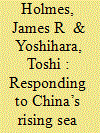

|
|
|
|
|
| Summary/Abstract |
America’s next president must embrace risk to cope with rising Chinese sea power. The incoming administration should pivot to the Asia-Pacific more boldly than the Obama administration has. As it does so, Washington must accept risk to its interests and forces to uphold freedom of the sea, and it must impress upon Beijing that infringing on freedom of the sea in the South China Sea or elsewhere carries unacceptable risks for China’s interests and forces. Rediscovering the art of imposing risk will let the incoming administration hold that which China treasures at risk, should China persist with its belligerence.
|
|
|
|
|
|
|
|
|
|
|
|
|
|
|
|
| 14 |
ID:
181213
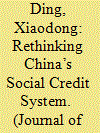

|
|
|
|
|
| Summary/Abstract |
China’s plan to establish a social credit system (SCS) has aroused the concern of building a surveillance state. Yet this view oversimplifies and misunderstands the essence of the SCS. The highest priorities of the SCS are promoting economic credibility and reinforcing court orders. Meanwhile, the SCS aims to steer citizens’ social behaviors and interactions by utilizing a redlist system that introduces numerous moderate rewards. The SCS is also more lax in execution than in planning. It reflects a unique Chinese understanding of law, which treats law as a moral guide. This article also acknowledges the concerns for the SCS. Without actively preventing positive and negative invasions in the construction of the project, the SCS authorities will risk creating further mistrust in society.
|
|
|
|
|
|
|
|
|
|
|
|
|
|
|
|
| 15 |
ID:
144441
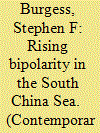

|
|
|
|
|
| Summary/Abstract |
This article synthesizes three elements of power and balancing in the South China Sea (SCS): analytical perspectives on China's behaviour and intentions, the American rebalance to Asia and the dispositions of American allies and partners. Based on extensive interviews and theoretical analysis, it concludes that ‘soft balancing’ backed by American military power provides the optimum chance for resolving the growing dispute. Short to medium-term weakness of Malaysia, Philippines and Vietnam, as well as Japan, means the United States must provide much of the military power while working to build their forces. The most promising alternative is multilateral diplomacy through the Association of Southeast Asian Nations’ Regional Forum, a vehicle for negotiating a Code of Conduct and implementation of the UN Convention on the Law of the Sea. If China remains motivated mainly by defense of realist interests, the costs imposed against expansion will eventually cause recalculation of Beijing's strategy, and soft balancing by the United States and its partners has a chance of working. The constructivist perspective, stressing self-conceptualization of Chinese strategic culture, supports Chinese confidence that patience will eventually bring dominance. If China tries offensively to change the status quo, soft balancing is less likely to influence Beijing. President Xi Jin Ping appears to be offensively asserting power, seeking regional dominance before he is due to step down in 2023. This supports the finding of enhanced risks of unintended escalation in the SCS and the East China Sea.
|
|
|
|
|
|
|
|
|
|
|
|
|
|
|
|
| 16 |
ID:
154782
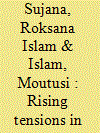

|
|
|
|
|
| Summary/Abstract |
The paper seeks to assess the reasons behind rising tensions in the South China Sea and its implications. It finds that geopolitical significance, abundance of energy resources and fisheries are some of the factors responsible. The rebalance strategy of the United States (US), China’s strategic posture and involvement of claimant and non-claimant actors have intensified tensions by ongoing militarisation in the region. In addition, the dispute has direct impacts on energy security and depletion of fish stocks. It also affects the regional and international order by questioning the efficiency of the Association of Southeast Asian Nations (ASEAN) and the United Nations (UN) to address the tensions properly. However, by analysing the threat potentials, the paper argues that though there is a significant chance of conflict, the claimant parties - China and the US would not involve in any major military confrontation that would hamper their stable working relationship.
|
|
|
|
|
|
|
|
|
|
|
|
|
|
|
|
| 17 |
ID:
145225
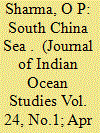

|
|
|
| 18 |
ID:
158231
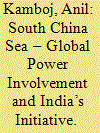

|
|
|
|
|
| Summary/Abstract |
South China Sea (SCS) which encompasses an area from the Singapore and Malacca Straits to the Strait of Taiwan, consisting of Dongsha, Xisha (known as Paracel), Zhongsha (also Huangyan in Chinese) and Nansha (Spratly) islands, has long been a bone of contention between China and Southeast Asian countries.
|
|
|
|
|
|
|
|
|
|
|
|
|
|
|
|
| 19 |
ID:
160149
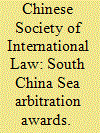

|
|
|
|
|
| Summary/Abstract |
This critical Study analyzes in detail the award on jurisdiction and admissibility of 29 October 2015 and the award of 12 July 2016 in the South China Sea Arbitration. After briefly introducing the project and the Study and describing the background to and course of the South China Sea Arbitration and the position of the Chinese Government, the Study moves to address one by one the following matters: jurisdiction; admissibility; historic rights; the status of China’s Nansha Qundao and Zhongsha Qundao; the legality of China’s activities in the South China Sea; due process and evidence. The Study closes with the conclusion that the Tribunal’s many errors deprive its awards of validity and threaten to undermine the international rule of law. Included as annexes are five useful official documents of the Chinese government on jurisdiction, the two awards, China’s territorial sovereignty and maritime rights and interests in the South China Sea, and China’s adherence to the position of settling through negotiation the relevant disputes between China and the Philippines in the South China Sea.
|
|
|
|
|
|
|
|
|
|
|
|
|
|
|
|
| 20 |
ID:
144507
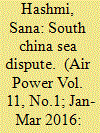

|
|
|
|
|
|
|
|